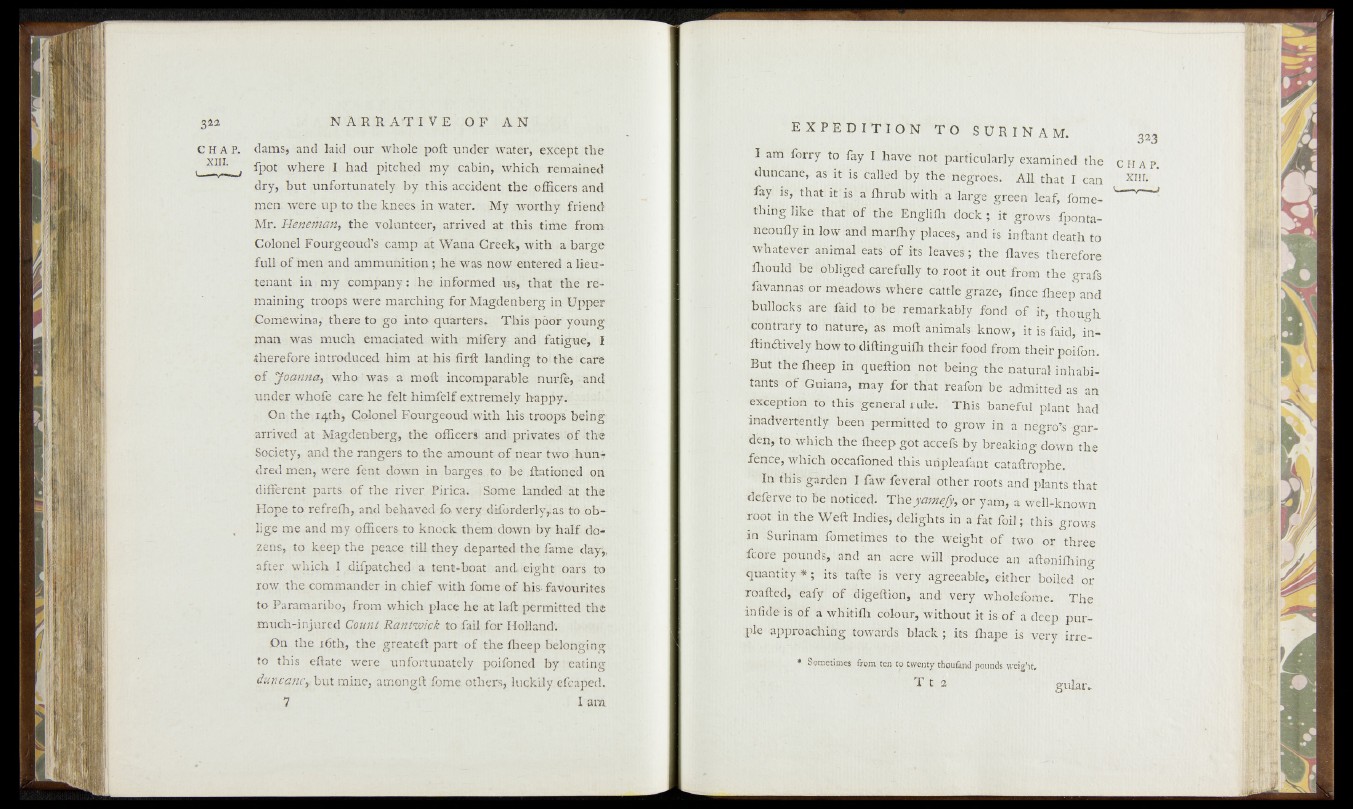
CHAP, dams, and laid our whole poft under water, except the
, XIII‘ . fpot where jI had pitched my cabin, which remained
dry# but unfortunately by this accident the officers and
men were up to the knees- in water. My worthy friend
Mr. Ileneman, the volunteer, arrived at this time, from
Colonel Fourgeoud’s camp, at Wana Creek, with a barge
full of men and ammunition; he was now entered a lieutenant
in my company: ,he informed us, that the remaining
troops were marching for Magdenherg in Upper
Comewina,' there to go into quarters. This poor young
man was much emaciated with mifery andiihti|fue, I
therefore introduced him at.his firft landing to the cate
of Joanna, who was a moft incomparable nurfe, -and
under whofe care he felt himfelf extremely hapj&yy’ :
On the 14th, (Lionel Fourgeoud jwith bis>tm>ps teeihg,
arrived at Magdenherg, the officers! andi privates! ?eflthe
Society, ^nd the rangers to the amount of near two^bun*
dred men, were fent down in .barges, to be .itatrdned on
-different parts of the river. Pirica. jSome landed at the
Hope torefreffi,. and behaved Jq, very; d rfo r derl<y ; as to .oh--
. lige rne and my officers to knock them; down hyrhaffdo*:
zqns, to keep the peace till they departed the fame, day*
after which 1 difpatched a tent-boat ' and eight oars to
row, the commander in chief with fame o f his- favourites
to Paramaribo* from which place he at laft permitted the
much-injured Count Rantmck to fail for Holland.
0 n the 16th, th e . greateft part of the fheep belonging
to this eftate were urtfortunately poifoned by -eating
duncane.y- but mine, amengft fome others, luckily, ©fcaped,
7 I am
I am t o y to}’fay I have not particularly examined the c h a p .
duheâmé, 'as it is called» tjÿ thb negrôës. AIL that I can XIII.
fayFft* that:dtjisia' fhrub with a darge green-leaf, fome- ' ^ '
thing like th at'o f the Engliffi ‘dock ; ii -grows fponta-
heoufly in Iow;and marfhy places, and is} ioftant death to
whatever ahimal eatsvof its leaves; the flaves'therefore
flioûld be obliged carefully to toot itJont from the grafs
favanrias or meadows where cattle graze,; finee. ffieep and
bullocks are faid to bë remarkâbly fond- of it, thqùgh
contrary tô nature, as moft animafs}%^o%'it'iM&d, in-
ftindtively howto diftinguifh their fo.©d.;%m thçirpoifon.
But the fheCp in ! queff ion' hot U i n f the natural inhabitants
of Guiana, may for that fceaforf Se admitteÿdfïan
exception, tfe this gênerai rule. 'T h is banefill plant had'
inàdÿërrtîdntly been permitted to'grow in à njlgpo^s g ar-
dep,»to which the ffieep g ^ Ic c ë fs h y breaking down the
fence, which occafioned this uripleafant cltàèrophêl
In this garden I faw fevferal other rdots and plaritè that
defervé'tb be noti&dj T h e y ^ ^ o r yam, a well-known
^6ot in fhe Weft Indies; deïfghts in a fat fqil | this! grows
in Surinam fometinM to the weight ofvfWogor three
■lbore pounds, 'and an acre will produce à,ÿiftonifl3ino-
quantity-*; its tafte à •.-very agreeable," ekfrëi| boiled; or ■
roafted, eafy of digeftion, and very wholefome- The
infide'is of a whitifli colour* without at is-of à dê,ep'par-
pie approaching towards black ; .its fhape is Iyer y irre-
* Sometimes from ten to twenty tfioufandipoa^ds weight,
T t 2 gular*